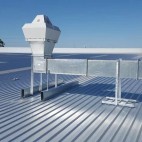South Africa is still likely to see above inflation increases in electricity prices over the next few years, making it increasingly important for business owners to consider alternative sources of energy.
This according to Mila Loubser, Head of Engineering Intelligence a division that does forecasting, modelling and monitoring in the energy sector for Energy Partners. She adds that the large investments Eskom is currently making in infrastructure are likely to affect energy tariffs in the near future.
"Since 2008 the average tariff increase in South Africa has been around 300%. According to our research, the next eight years will likely see a year-on-year tariff increase of at least 6% to 8%. In light of the upcoming 2017 Budget Speech, we are also waiting to find out if the government will introduce a new carbon tax. If this is the case, tariff increases could be as high as 13%," Loubser says.
According to Loubser, this trend will have the largest impact on small and medium enterprises (SMEs).
"As we have seen in previous years, energy tariff hikes and other power related issues such as load shedding, had massive impacts on the operating costs and the already low profit margins of SMEs. There are however opportunities for smaller companies to reduce the impact of power costs and supply on their business."
Cala van der Westhuizen, Spokesperson for Energy Partners Home Solutions, notes that SMEs should take advantage of the incentives provided for the installation of renewable energy solutions. "SMEs need to keep in mind that they can claim a percentage of the cost of solar and other renewable energy solutions back from SARS. Some banks also offer financing to their business banking clients for renewable energy solutions."
Alternatively, Van der Westhuizen notes that businesses can also consider financing options from certain service providers. "The Home Solutions division at Energy Partners provides various financing options for renewable energy systems to SMEs with energy requirements below 50kW. Energy Partners' Solar Commercial division also provides a number of bespoke energy saving solutions for larger companies. Additionally, there are pay-as-you-use and leasing service agreements available for qualifying businesses, eliminating the upfront cost of installing renewable solutions," he adds.
There are a number of benefits to installing solar energy solutions in small businesses, all of which contribute to reducing operating costs and downtime in the event of power outages, according to Van der Westhuizen.
"A full solar solution can reduce the average SME's electricity consumption by as much as 30%. This figure is of course dependent on the nature of the business. Additionally, custom heating, cooling and energy efficiency solutions have also resulted up to 30% reductions in electricity use for a number of our clients."
Consequently, Loubser notes that businesses that achieve notable electricity usage decreases also qualify for tariff reductions from their local municipalities. "Negotiating for lower tariffs with one's municipality can become quite a tedious process, but it is possible and potentially beneficial to the business. Employing a service provider to negotiate on the company's behalf also simplifies this process considerably," she adds.
Van der Westhuizen points out that reliability of energy supply is vital for SMEs. "With this in mind, it is important for business owners to do a proper cost-benefit analysis to ensure that they are making the correct decisions, implementing the right energy solutions and using the optimal financing vehicle to reduce their annual energy spend," Van der Westhuizen concludes.










